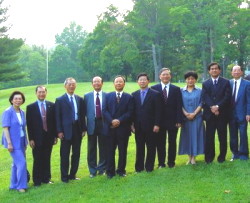Becoming a signatory of the Washington Accord (WA), Taiwan's certification of engineering education elevates to an international level

To solve Taiwan's engineering education problems, the MOE Advisory Office launched a series of programs in 1990. MOE in 1994 and 1995 held the International Conference on Engineering Education (ICEE) and in 2003 the Office convened the 2003 Conference on Engineering Education by inviting presidents and deans of Taiwan's engineering universities and colleges to attend. At the Conference, attendees discussed the organizing of the Institute of Engineering Education Taiwan (IEET), which was set up in the same year and has become the most important organization in promoting the reform of Taiwan's engineering education.
Engineering education comprises mainly fields concerning public safety that include engineering, medicine, law, and business. Certification is of great significance and can be regarded as a voluntary quality assurance system. Each department and school may set its own objectives and undertake reform of the curriculum or the department or school according to the standards established by the certification organization until it reaches the organization's standards.
Certification of engineering education departments and schools features Results Orientation, Industry-Academia Interaction, Continual Improvement and Internationalization. Among them, Results Orientation aims to evaluate students' studying results, and help departments and schools to reform curricula. Individuals graduated from an IEET-certified undergraduate department should possess the eight core abilities of a basic-level professional engineer. As long as they meet the certification organization's standards, the graduates of a certified department will be able to guarantee that its graduates possess an engineer's basic abilities, which is very helpful for a graduate to seek further education or employment. The other three features – Industry-Academia Interaction, Continual Improvement and Internationalization – encourage close interaction between academia and industry and narrow the divide between the two. Consequently, students can find a job soon after graduation, gain an insight into the industry's latest developments, and become more visible globally.
In just a few years, under the auspices of the MOE, IEET engineering education certification has become Taiwan's first education certification system, and Taiwan's first education quality assurance mechanism recognized by the international community. From academic year 2004 until academic year 2006, departments ranging from civil engineering and machinery to materials, aerospace and architecture of national, private, research-based, comprehensive and technical universities, and technical colleges had undergone certification. More and more departments and schools are undergoing certification. Only 12 departments and schools applied for certification in academic year 2004. The number has risen to 141 in academic year 2007 and is increasing each year.
Mutual recognition of professional qualifications has many benefits
Engineering education certification assists departments not only in examining their curricula and teaching reforms, but also in drawing up teaching strategies and educational objectives so that students are equipped with engineering knowledge and practical experience. The Department of Higher Education has announced that departments having passed IEET certification may be exempted from teaching evaluation. The Department of Technological & Vocational Education is considering making the same announcement.
In addition, the Internationalization feature will allow Taiwan's engineering education to be elevated to international levels. Because as far as Taiwan educational institutions are concerned, the certification does allow Taiwan's engineering education to be elevated to international levels.
First of all, Taiwan's diplomas will be recognized. In the past, certain countries, including Hong Kong and Malaysia, that didn't recognize Taiwan's diplomas will recognize the diplomas held by individuals graduated from IEET-certified schools via the mutually recognized platform of WA. The advancement will allow Taiwan graduates' diplomas to be accepted by more countries and help Taiwan's educational institutions to attract more foreign students.
Secondly, Taiwanese graduates will be able to apply for foreign Professional Engineer (PE) licenses. In the future, individuals who have graduated from an IEET-certified educational institution and who are applying for a PE license in a WA member state will be able to receive the same treatment as those graduates from a local certified school. For example, Canadian individuals graduated from a certified school are not required to take written exams. In the future, Taiwan individuals graduated from an IEET-certified school will receive the same treatment when applying for a PE license in Canada. The same applies in the US.
Meanwhile, Taiwanese technicians will be able to apply for an APEC Engineer license. The Professional Engineers recognized by Taiwan's APEC Engineer Registry are the graduates of IEET-certified schools. Therefore, Taiwanese technicians (PEs) graduated from a certified school may be registered as an APEC Engineer after undergoing specific procedures.
In the academic year 2006, IEET began certifying graduate schools. Taiwan will become one of the first countries to certify engineering education at the graduate level. So far, only Japan, Germany and Ireland certify graduate education. On average, each year one out of four Taiwanese university graduates having earned a bachelor's degree in engineering obtains a master's degree. The percentage is the highest in the world and the advantage of Taiwan's human resources. When compared with other countries, it is necessary for Taiwan to certify education at the graduate level in order to ensure the quality of its graduates. The introduction of the certification of graduate education is an important advancement that attracts international attention and demonstrates the progress Taiwan has made in certifying engineering education, as well as the flexibility and adaptability it possesses to cope with changes. The Ministry of Education will continue to promote certification of engineering education and take part in international activities through WA in an effort to let the world know the value of Taiwan's engineering education.